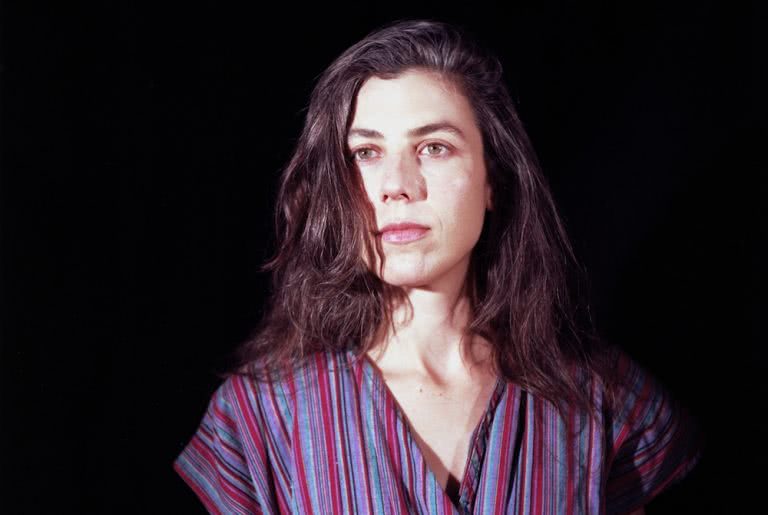For her fifth album Aviary, Julia Holter took a turn away from her much-lauded 2015 record Have You In My Wilderness. Here, she trades the baroque pop of her previous album for a record that stretches out, experiments and often goes to some complicated places sonically.
On Aviary, Holter rejects the binary approach that dissonant or harsh sounds can’t create something beautiful, and tracks like the album’s first single ‘I Shall Love 2’ sit with a kind of ambiguous tension that makes for a compelling, if occasionally challenging, listen.
“With all my records I feel like there’s a different approach every time; they’re all very different projects,” explains Holter. “None of them are ever me trying to go in a specific trajectory for the whole rest of my life. Wilderness felt like a specific journey for me. I had written ‘Betsy On The Roof’ and ‘Sea Calls Me Home’ many years prior, and I wanted to make a whole record to work with those songs.”
In addition to the poppy nature of Wilderness, the album also saw Holter lean away from other tendencies – to experiment with text, and have extended forms that the sound dictates. With Aviary, however, Holter says she let her subconscious guide the album’s composition – beginning with what she calls “cathartic solo improvisations” at home.
“This record is more kind of letting myself do the thing I’ve done in the past to a greater extent; being even freer in a way. I don’t usually set out with a really specific goal in mind. It’s usually more that the form of the record kind of emerges through writing and so in this case, I was following the sound… I wasn’t sure what I wanted to do, so I just started improvising.”
Watch the clip for ‘I Shall Love 2’ by Julia Holter below

While recordings started at home in a relatively barebones manner, the songs on Aviary are lush and textural, filled out with strings and brass arrangements Holter wrote and took to session musicians.
“I record things at home which are sometimes demos but sometimes get used in final recordings. In the case of this record, and most records, the thing that happens is I’ve recorded things at home, we go into the studio, I put up charts for the musicians. In the past it’s been Cole MGN. This time Kenny Gilmore joined us too, and we’re there in the studio recording the musicians.
“There’s parts that are more improvised than others, but with every record it’s different. I tend to go home after the studio musicians and record myself at home. I recorded most of my synth parts at home. The beginning and end is me recording at home; it’s like a studio recording sandwich.”
There’s these distinctions between what’s good and bad, and what is consonant and dissonant.
Holter took the album’s title from a passage in in writer Etel Adnan‘s short story collection Master Of The Eclipse – “I found myself in an aviary full of shrieking birds”. At a time when there is so much going on – so many people screaming about what they think is right – Holter seeks through the textures and sounds on Aviary to find room for ambiguity, for subtlety, for sitting with what isn’t immediately clear. Voices swirl together, and it can be hard to immediately identify concrete melodies.
Holter uses this to make connections to the world around us. Can sitting with that ambiguity form an active resistance to the cacophony that surrounds us? Can disrupting the hierarchies of history, language and musical form create something that instead communicates empathy and connection?
“There’s these distinctions between what’s good and bad, and what is consonant and dissonant. I somehow made these loose connections in my mind; like there’s an ambiguity in certain music where it sounds really good, but also really harsh.”
Watch the clip for ‘Words I Heard’ by Julia Holter below

Holter points to Aviary track ‘Everyday Is An Emergency’ as an example. “There’s kind of a shrieking sound I really like in it. It’s kind of painful, but I really enjoy it.”
Julia Holter is known for a level of intertextuality in her songs, enmeshing references to other works and time periods. ‘I Would Rather See’ borrows from a Sappho poem translated by Anne Carson; ‘Why Sad Song’ is an English phonetic translation of a song by Nepalese Buddhist nun Ani Choying Drolma. Musically, there is a juxtapositional collage between old and new – with futurist synths sitting alongside elements of medieval chamber music.
One track on the record is entitled ‘Colliegere’, a Latin word which means to collect – Holter explains that she sees her writing in a similar way, a process of collecting different materials.
“A lot of the stuff I’m reading while I’m writing, I kind of just get ideas when I come across them. With this record, I did seek out this book, The Book of Memory [by Mary Carruthers] which I had read in the past because it felt like it was applying to what I was doing.
“So, often I’ll remember something and re-read it. The Book of Memory came to mind, this book I had read, the word “aviary” came into my mind, and then I thought about this book which talks about the way that bird cages were seen in the middle ages as symbols of storage of memory.
“I’ll be reading things and realise they resonate with what I’m doing. I think of music making and art making as kind of translations.”
Aviary is out now.
Read another interview, with songwriter Anna Calvi, here.




































